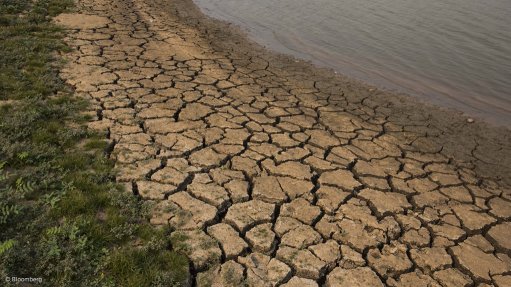Gold mining puts $171bn into global economy – World Gold Council
JOHANNESBURG (miningweekly.com) – The global gold mining industry collectively contributed $171.6-billion-plus to the global economy in 2013, which is more than the combined gross domestic product (GDP) of Ecuador, Ghana and Tanzania, or close to half of the GDP of South Africa or Denmark.
The World Gold Council (WGC) report on the social and economic impacts of gold mining, which it produced with international economics consultancy Maxwell Stamp, also found gold mining companies to be a major source of income and economic growth for host countries, with an important role in supporting sustainable socioeconomic development.
“This is the culmination of a stream of work to try and quantify the global economic footprint of formal gold mining and some of its social impacts, looking at the common themes across the industry rather than specific case studies,” WGC member and investor relations head John Mulligan told Creamer Media’s Mining Weekly Online in a conference call from London on Wednesday.
Globally, gold mining companies directly employed more than one-million people in 2013, with 4.2-million more people employed as a result of the industry’s suppliers and support services, Mulligan said.
The report shows that gold mining has made progress in human capital and skills development and that in most gold producing countries, more than 90% of the industry’s employees are local workers.
However, the report indicates that growth in the economic contribution of gold mining often coincides with a marked improvement in income status of host nations.
Analysing the impacts of large-scale commercial gold mining in 47 gold producing countries, collectively accounting for more than 90% of the world’s gold production, the report provides greater insight into the benefits of commercial gold mining at global, national and host community levels.
“Our findings highlight that commercial gold mining is a major source of income and driver of economic growth, playing an important role in supporting the sustainable socioeconomic development of host nations and communities,” Mulligan added.
The $171-billion-plus overall contribution is calculated through taking the value created by support services and indirect employment.
But even 2013’s direct contribution of $83.1-billion is substantial in that it equals the combined GDP of Ghana and Tanzania.
The report finds that average mineworker salaries are consistently higher than the national average and broader benefits are obtained when training provides skills that are transferable beyond the mine.
A macro trend noted is the shift in the geographical location of the gold mining industry’s value creation activities from advanced to less developed economies, where gold mining companies are making significant investments in infrastructure, which has wider benefits for local communities beyond the life of the mine itself.
Among some of the smaller producing nations, the gold mining industry has also been found by the study to be very significant for national economies, particularly once the indirect impact of gold mining companies’ procurement is taken into account.
Gold mining companies, the report finds, play the important role of value creator and generator of financial resources for governments for development, with strong evidence that the Extractive Industries Transparency Initiative is having a positive impact on revenue reporting in resource-rich countries.
The study found gold mining to consistently pay above-average wages in developed countries and significantly above-average wages in less developed countries, where each worker typically supports a high number of dependants.
More than 60% of the countries covered are low-income or lower-middle income countries with substantial socioeconomic development needs.
Seventy per cent of the value that gold mining companies distribute within an economy relates to payments to local suppliers and employees.
Interestingly, the majority of government revenues from gold mining are derived from sources such as corporate and income tax rather than from money relating to permits and royalties.
The social and economic impacts of gold mining also show that gold mining’s direct economic contribution to the global economy has increased seven-fold from 2000 to 2013, which is greater than the rise in value of gold over the same period.
“We hope the report will help foster productive engagement between gold mining companies and the industry’s wider stakeholders,” said Maxwell Stamp’s Andrew Britton.
While there has been major progress in recent years in attempting to measure gold mining’s economic impacts, this has often been piecemeal or confined to a specific country.
The lack of information has held back constructive debate on how to make the most of the shared value that a responsible gold mining industry can create for host nations and communities.
By building on previous research and identifying industry-wide thematic trends, this work has made substantial progress in bridging the information gap, added Britton.
Comments
Press Office
Announcements
What's On
Subscribe to improve your user experience...
Option 1 (equivalent of R125 a month):
Receive a weekly copy of Creamer Media's Engineering News & Mining Weekly magazine
(print copy for those in South Africa and e-magazine for those outside of South Africa)
Receive daily email newsletters
Access to full search results
Access archive of magazine back copies
Access to Projects in Progress
Access to ONE Research Report of your choice in PDF format
Option 2 (equivalent of R375 a month):
All benefits from Option 1
PLUS
Access to Creamer Media's Research Channel Africa for ALL Research Reports, in PDF format, on various industrial and mining sectors
including Electricity; Water; Energy Transition; Hydrogen; Roads, Rail and Ports; Coal; Gold; Platinum; Battery Metals; etc.
Already a subscriber?
Forgotten your password?
Receive weekly copy of Creamer Media's Engineering News & Mining Weekly magazine (print copy for those in South Africa and e-magazine for those outside of South Africa)
➕
Recieve daily email newsletters
➕
Access to full search results
➕
Access archive of magazine back copies
➕
Access to Projects in Progress
➕
Access to ONE Research Report of your choice in PDF format
RESEARCH CHANNEL AFRICA
R4500 (equivalent of R375 a month)
SUBSCRIBEAll benefits from Option 1
➕
Access to Creamer Media's Research Channel Africa for ALL Research Reports on various industrial and mining sectors, in PDF format, including on:
Electricity
➕
Water
➕
Energy Transition
➕
Hydrogen
➕
Roads, Rail and Ports
➕
Coal
➕
Gold
➕
Platinum
➕
Battery Metals
➕
etc.
Receive all benefits from Option 1 or Option 2 delivered to numerous people at your company
➕
Multiple User names and Passwords for simultaneous log-ins
➕
Intranet integration access to all in your organisation





















